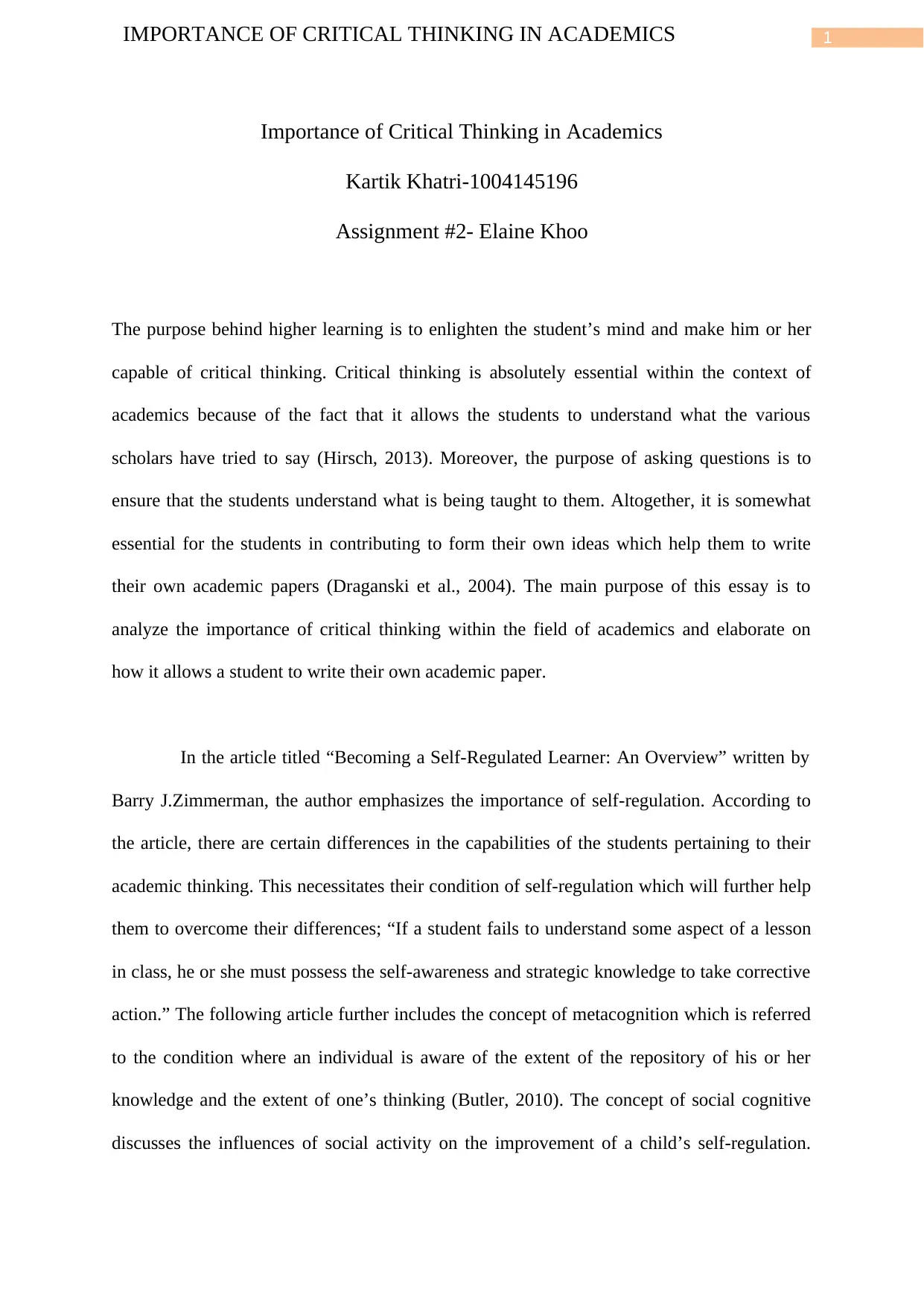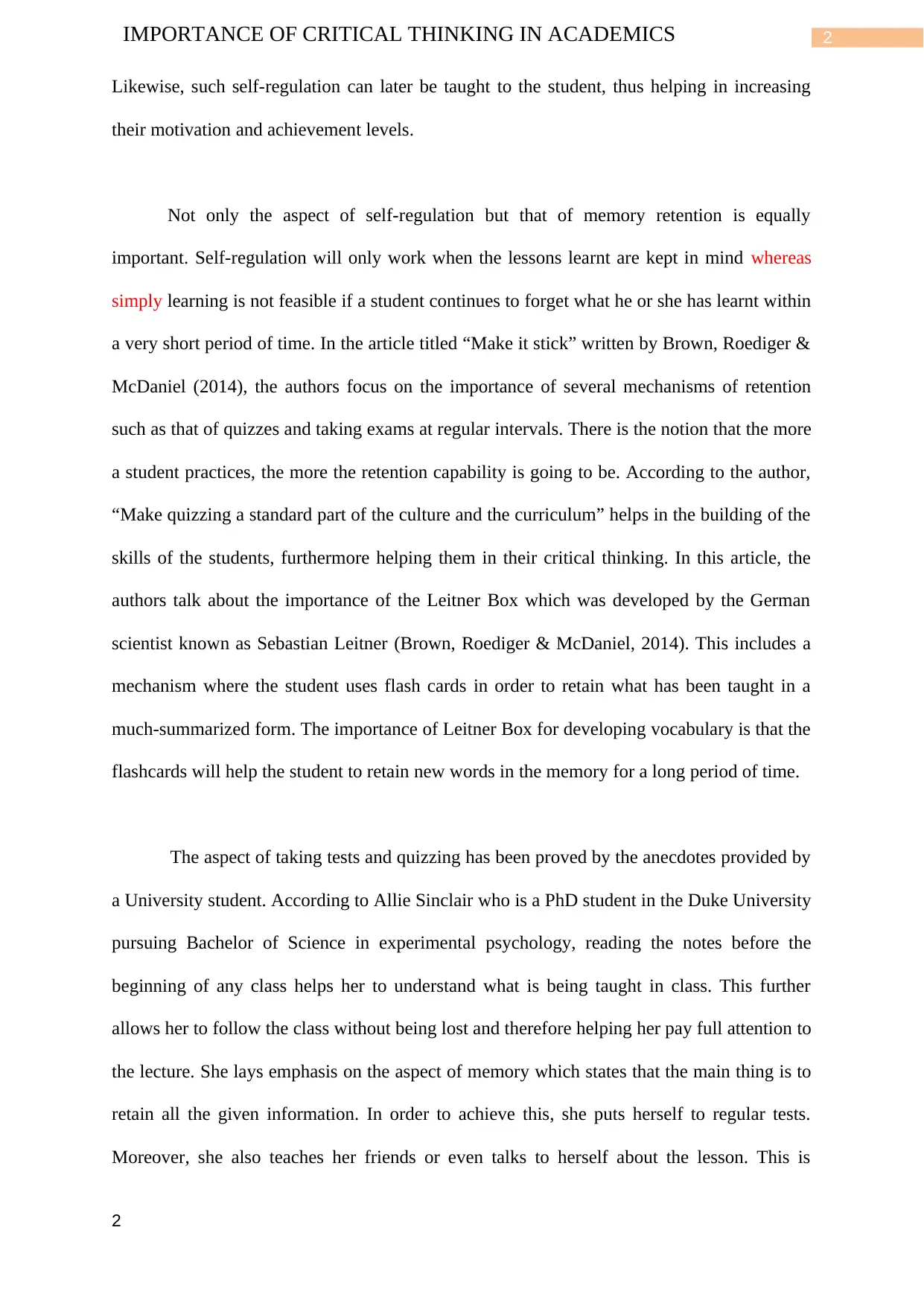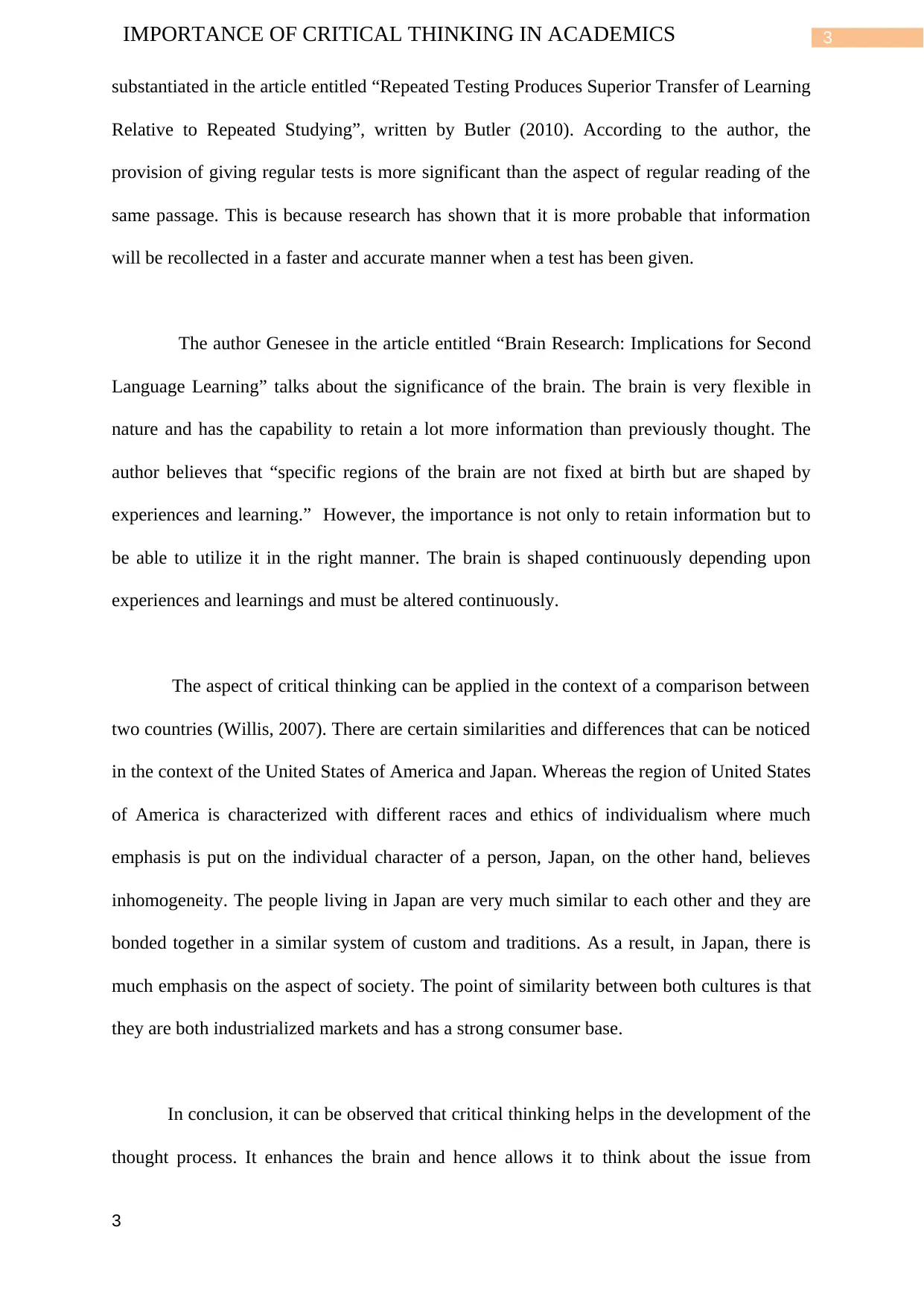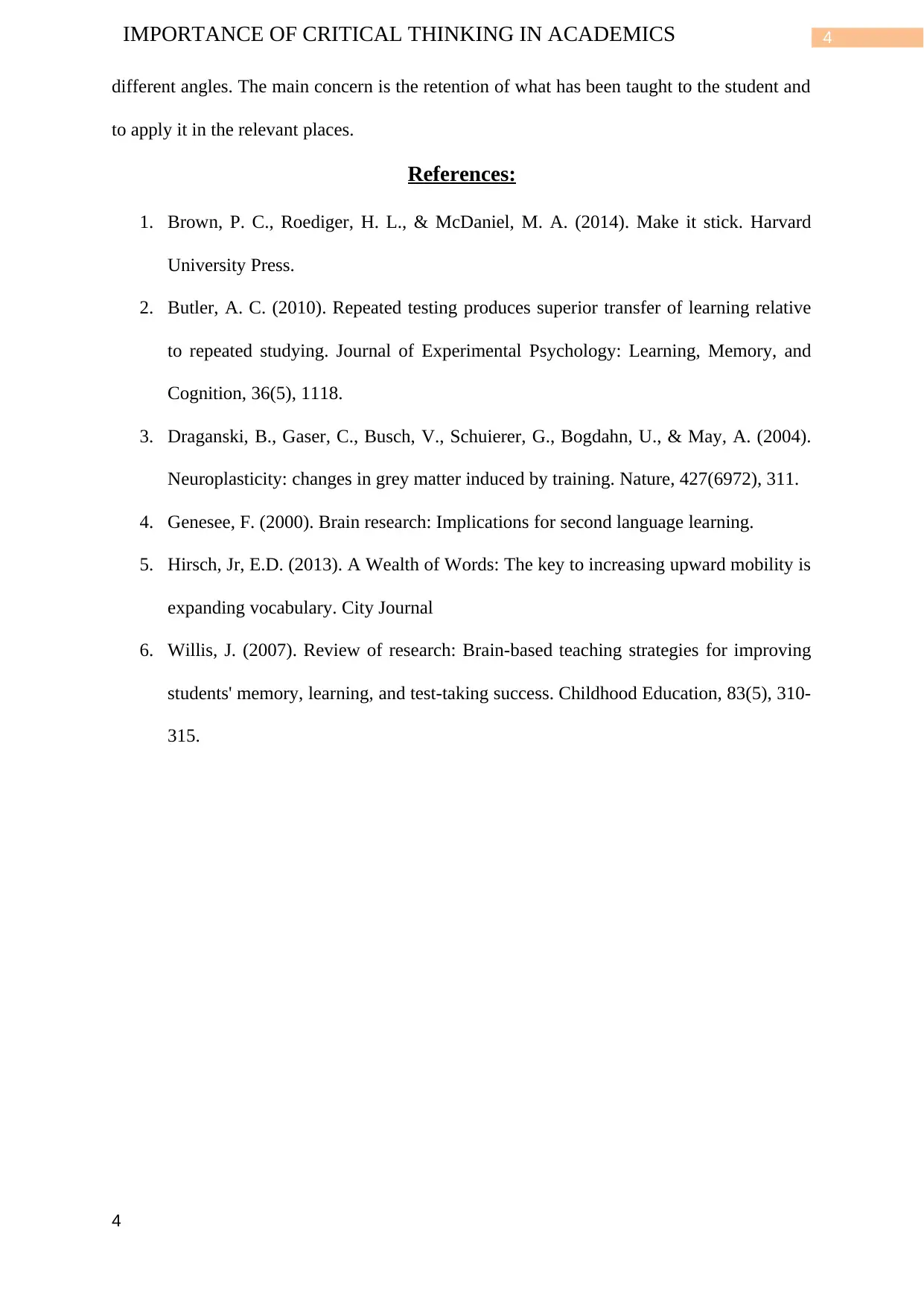Critical Thinking in Academics: CTLA01 Winter 2019 Course Reading
VerifiedAdded on 2023/04/22
|4
|1352
|279
Essay
AI Summary
This essay analyzes the importance of critical thinking in academics, emphasizing its role in understanding scholarly work and developing original ideas for academic papers. It discusses self-regulation, metacognition, and the influence of social activity on learning, drawing from Zimmerman's work on self-regulated learners. The essay also highlights the significance of memory retention, utilizing techniques like quizzes and the Leitner Box, as discussed by Brown, Roediger, and McDaniel. Furthermore, it connects brain research to learning, emphasizing the brain's flexibility and the importance of utilizing information effectively. The essay concludes by comparing cultural differences between the United States and Japan to illustrate the application of critical thinking in diverse contexts, reinforcing the idea that critical thinking enhances the thought process and enables individuals to approach issues from multiple perspectives.

1IMPORTANCE OF CRITICAL THINKING IN ACADEMICS
Importance of Critical Thinking in Academics
Kartik Khatri-1004145196
Assignment #2- Elaine Khoo
The purpose behind higher learning is to enlighten the student’s mind and make him or her
capable of critical thinking. Critical thinking is absolutely essential within the context of
academics because of the fact that it allows the students to understand what the various
scholars have tried to say (Hirsch, 2013). Moreover, the purpose of asking questions is to
ensure that the students understand what is being taught to them. Altogether, it is somewhat
essential for the students in contributing to form their own ideas which help them to write
their own academic papers (Draganski et al., 2004). The main purpose of this essay is to
analyze the importance of critical thinking within the field of academics and elaborate on
how it allows a student to write their own academic paper.
In the article titled “Becoming a Self-Regulated Learner: An Overview” written by
Barry J.Zimmerman, the author emphasizes the importance of self-regulation. According to
the article, there are certain differences in the capabilities of the students pertaining to their
academic thinking. This necessitates their condition of self-regulation which will further help
them to overcome their differences; “If a student fails to understand some aspect of a lesson
in class, he or she must possess the self-awareness and strategic knowledge to take corrective
action.” The following article further includes the concept of metacognition which is referred
to the condition where an individual is aware of the extent of the repository of his or her
knowledge and the extent of one’s thinking (Butler, 2010). The concept of social cognitive
discusses the influences of social activity on the improvement of a child’s self-regulation.
Importance of Critical Thinking in Academics
Kartik Khatri-1004145196
Assignment #2- Elaine Khoo
The purpose behind higher learning is to enlighten the student’s mind and make him or her
capable of critical thinking. Critical thinking is absolutely essential within the context of
academics because of the fact that it allows the students to understand what the various
scholars have tried to say (Hirsch, 2013). Moreover, the purpose of asking questions is to
ensure that the students understand what is being taught to them. Altogether, it is somewhat
essential for the students in contributing to form their own ideas which help them to write
their own academic papers (Draganski et al., 2004). The main purpose of this essay is to
analyze the importance of critical thinking within the field of academics and elaborate on
how it allows a student to write their own academic paper.
In the article titled “Becoming a Self-Regulated Learner: An Overview” written by
Barry J.Zimmerman, the author emphasizes the importance of self-regulation. According to
the article, there are certain differences in the capabilities of the students pertaining to their
academic thinking. This necessitates their condition of self-regulation which will further help
them to overcome their differences; “If a student fails to understand some aspect of a lesson
in class, he or she must possess the self-awareness and strategic knowledge to take corrective
action.” The following article further includes the concept of metacognition which is referred
to the condition where an individual is aware of the extent of the repository of his or her
knowledge and the extent of one’s thinking (Butler, 2010). The concept of social cognitive
discusses the influences of social activity on the improvement of a child’s self-regulation.
Paraphrase This Document
Need a fresh take? Get an instant paraphrase of this document with our AI Paraphraser

2IMPORTANCE OF CRITICAL THINKING IN ACADEMICS
Likewise, such self-regulation can later be taught to the student, thus helping in increasing
their motivation and achievement levels.
Not only the aspect of self-regulation but that of memory retention is equally
important. Self-regulation will only work when the lessons learnt are kept in mind whereas
simply learning is not feasible if a student continues to forget what he or she has learnt within
a very short period of time. In the article titled “Make it stick” written by Brown, Roediger &
McDaniel (2014), the authors focus on the importance of several mechanisms of retention
such as that of quizzes and taking exams at regular intervals. There is the notion that the more
a student practices, the more the retention capability is going to be. According to the author,
“Make quizzing a standard part of the culture and the curriculum” helps in the building of the
skills of the students, furthermore helping them in their critical thinking. In this article, the
authors talk about the importance of the Leitner Box which was developed by the German
scientist known as Sebastian Leitner (Brown, Roediger & McDaniel, 2014). This includes a
mechanism where the student uses flash cards in order to retain what has been taught in a
much-summarized form. The importance of Leitner Box for developing vocabulary is that the
flashcards will help the student to retain new words in the memory for a long period of time.
The aspect of taking tests and quizzing has been proved by the anecdotes provided by
a University student. According to Allie Sinclair who is a PhD student in the Duke University
pursuing Bachelor of Science in experimental psychology, reading the notes before the
beginning of any class helps her to understand what is being taught in class. This further
allows her to follow the class without being lost and therefore helping her pay full attention to
the lecture. She lays emphasis on the aspect of memory which states that the main thing is to
retain all the given information. In order to achieve this, she puts herself to regular tests.
Moreover, she also teaches her friends or even talks to herself about the lesson. This is
2
Likewise, such self-regulation can later be taught to the student, thus helping in increasing
their motivation and achievement levels.
Not only the aspect of self-regulation but that of memory retention is equally
important. Self-regulation will only work when the lessons learnt are kept in mind whereas
simply learning is not feasible if a student continues to forget what he or she has learnt within
a very short period of time. In the article titled “Make it stick” written by Brown, Roediger &
McDaniel (2014), the authors focus on the importance of several mechanisms of retention
such as that of quizzes and taking exams at regular intervals. There is the notion that the more
a student practices, the more the retention capability is going to be. According to the author,
“Make quizzing a standard part of the culture and the curriculum” helps in the building of the
skills of the students, furthermore helping them in their critical thinking. In this article, the
authors talk about the importance of the Leitner Box which was developed by the German
scientist known as Sebastian Leitner (Brown, Roediger & McDaniel, 2014). This includes a
mechanism where the student uses flash cards in order to retain what has been taught in a
much-summarized form. The importance of Leitner Box for developing vocabulary is that the
flashcards will help the student to retain new words in the memory for a long period of time.
The aspect of taking tests and quizzing has been proved by the anecdotes provided by
a University student. According to Allie Sinclair who is a PhD student in the Duke University
pursuing Bachelor of Science in experimental psychology, reading the notes before the
beginning of any class helps her to understand what is being taught in class. This further
allows her to follow the class without being lost and therefore helping her pay full attention to
the lecture. She lays emphasis on the aspect of memory which states that the main thing is to
retain all the given information. In order to achieve this, she puts herself to regular tests.
Moreover, she also teaches her friends or even talks to herself about the lesson. This is
2

3IMPORTANCE OF CRITICAL THINKING IN ACADEMICS
substantiated in the article entitled “Repeated Testing Produces Superior Transfer of Learning
Relative to Repeated Studying”, written by Butler (2010). According to the author, the
provision of giving regular tests is more significant than the aspect of regular reading of the
same passage. This is because research has shown that it is more probable that information
will be recollected in a faster and accurate manner when a test has been given.
The author Genesee in the article entitled “Brain Research: Implications for Second
Language Learning” talks about the significance of the brain. The brain is very flexible in
nature and has the capability to retain a lot more information than previously thought. The
author believes that “specific regions of the brain are not fixed at birth but are shaped by
experiences and learning.” However, the importance is not only to retain information but to
be able to utilize it in the right manner. The brain is shaped continuously depending upon
experiences and learnings and must be altered continuously.
The aspect of critical thinking can be applied in the context of a comparison between
two countries (Willis, 2007). There are certain similarities and differences that can be noticed
in the context of the United States of America and Japan. Whereas the region of United States
of America is characterized with different races and ethics of individualism where much
emphasis is put on the individual character of a person, Japan, on the other hand, believes
inhomogeneity. The people living in Japan are very much similar to each other and they are
bonded together in a similar system of custom and traditions. As a result, in Japan, there is
much emphasis on the aspect of society. The point of similarity between both cultures is that
they are both industrialized markets and has a strong consumer base.
In conclusion, it can be observed that critical thinking helps in the development of the
thought process. It enhances the brain and hence allows it to think about the issue from
3
substantiated in the article entitled “Repeated Testing Produces Superior Transfer of Learning
Relative to Repeated Studying”, written by Butler (2010). According to the author, the
provision of giving regular tests is more significant than the aspect of regular reading of the
same passage. This is because research has shown that it is more probable that information
will be recollected in a faster and accurate manner when a test has been given.
The author Genesee in the article entitled “Brain Research: Implications for Second
Language Learning” talks about the significance of the brain. The brain is very flexible in
nature and has the capability to retain a lot more information than previously thought. The
author believes that “specific regions of the brain are not fixed at birth but are shaped by
experiences and learning.” However, the importance is not only to retain information but to
be able to utilize it in the right manner. The brain is shaped continuously depending upon
experiences and learnings and must be altered continuously.
The aspect of critical thinking can be applied in the context of a comparison between
two countries (Willis, 2007). There are certain similarities and differences that can be noticed
in the context of the United States of America and Japan. Whereas the region of United States
of America is characterized with different races and ethics of individualism where much
emphasis is put on the individual character of a person, Japan, on the other hand, believes
inhomogeneity. The people living in Japan are very much similar to each other and they are
bonded together in a similar system of custom and traditions. As a result, in Japan, there is
much emphasis on the aspect of society. The point of similarity between both cultures is that
they are both industrialized markets and has a strong consumer base.
In conclusion, it can be observed that critical thinking helps in the development of the
thought process. It enhances the brain and hence allows it to think about the issue from
3
⊘ This is a preview!⊘
Do you want full access?
Subscribe today to unlock all pages.

Trusted by 1+ million students worldwide

4IMPORTANCE OF CRITICAL THINKING IN ACADEMICS
different angles. The main concern is the retention of what has been taught to the student and
to apply it in the relevant places.
References:
1. Brown, P. C., Roediger, H. L., & McDaniel, M. A. (2014). Make it stick. Harvard
University Press.
2. Butler, A. C. (2010). Repeated testing produces superior transfer of learning relative
to repeated studying. Journal of Experimental Psychology: Learning, Memory, and
Cognition, 36(5), 1118.
3. Draganski, B., Gaser, C., Busch, V., Schuierer, G., Bogdahn, U., & May, A. (2004).
Neuroplasticity: changes in grey matter induced by training. Nature, 427(6972), 311.
4. Genesee, F. (2000). Brain research: Implications for second language learning.
5. Hirsch, Jr, E.D. (2013). A Wealth of Words: The key to increasing upward mobility is
expanding vocabulary. City Journal
6. Willis, J. (2007). Review of research: Brain-based teaching strategies for improving
students' memory, learning, and test-taking success. Childhood Education, 83(5), 310-
315.
4
different angles. The main concern is the retention of what has been taught to the student and
to apply it in the relevant places.
References:
1. Brown, P. C., Roediger, H. L., & McDaniel, M. A. (2014). Make it stick. Harvard
University Press.
2. Butler, A. C. (2010). Repeated testing produces superior transfer of learning relative
to repeated studying. Journal of Experimental Psychology: Learning, Memory, and
Cognition, 36(5), 1118.
3. Draganski, B., Gaser, C., Busch, V., Schuierer, G., Bogdahn, U., & May, A. (2004).
Neuroplasticity: changes in grey matter induced by training. Nature, 427(6972), 311.
4. Genesee, F. (2000). Brain research: Implications for second language learning.
5. Hirsch, Jr, E.D. (2013). A Wealth of Words: The key to increasing upward mobility is
expanding vocabulary. City Journal
6. Willis, J. (2007). Review of research: Brain-based teaching strategies for improving
students' memory, learning, and test-taking success. Childhood Education, 83(5), 310-
315.
4
1 out of 4
Your All-in-One AI-Powered Toolkit for Academic Success.
+13062052269
info@desklib.com
Available 24*7 on WhatsApp / Email
![[object Object]](/_next/static/media/star-bottom.7253800d.svg)
Unlock your academic potential
Copyright © 2020–2025 A2Z Services. All Rights Reserved. Developed and managed by ZUCOL.
